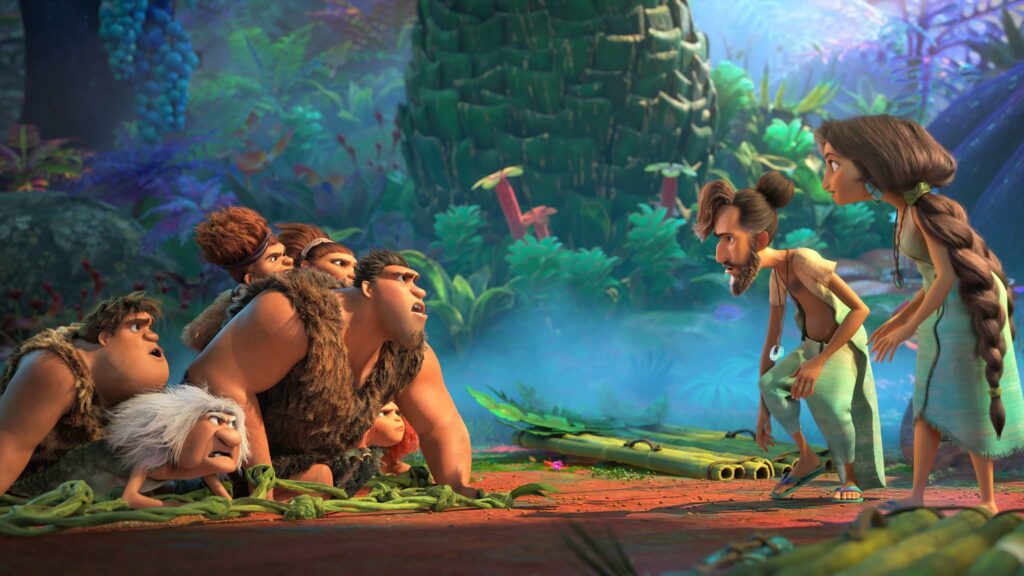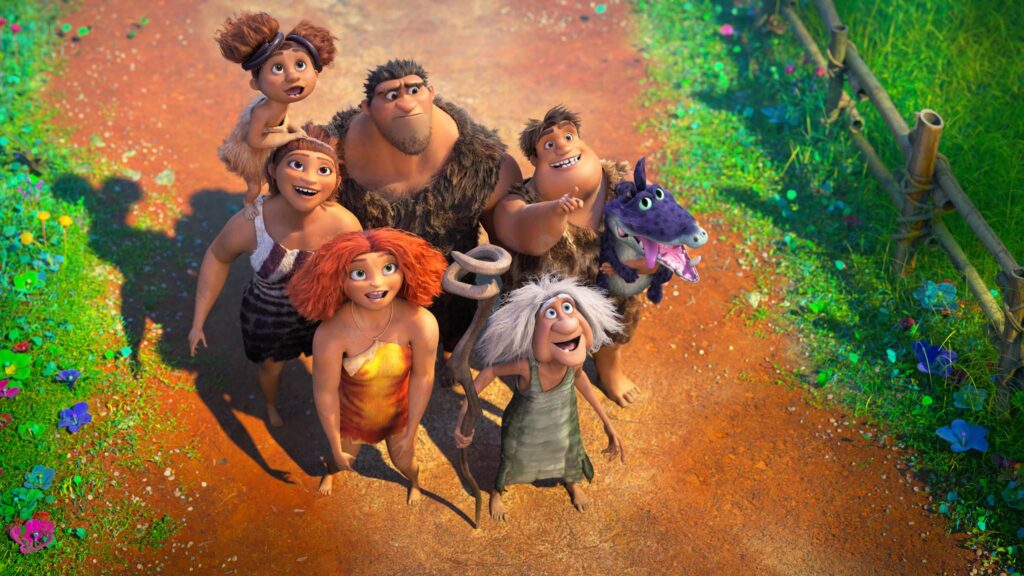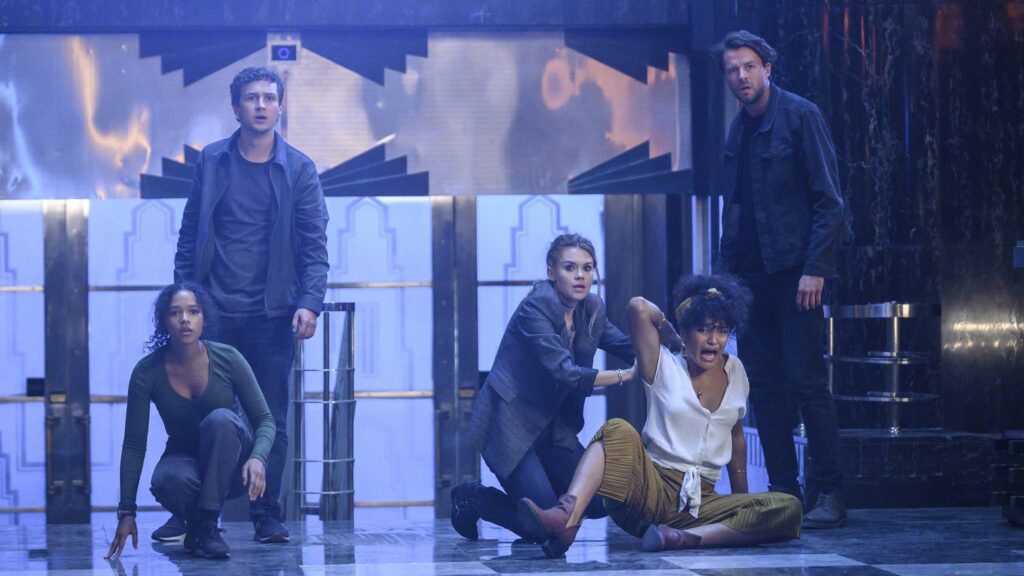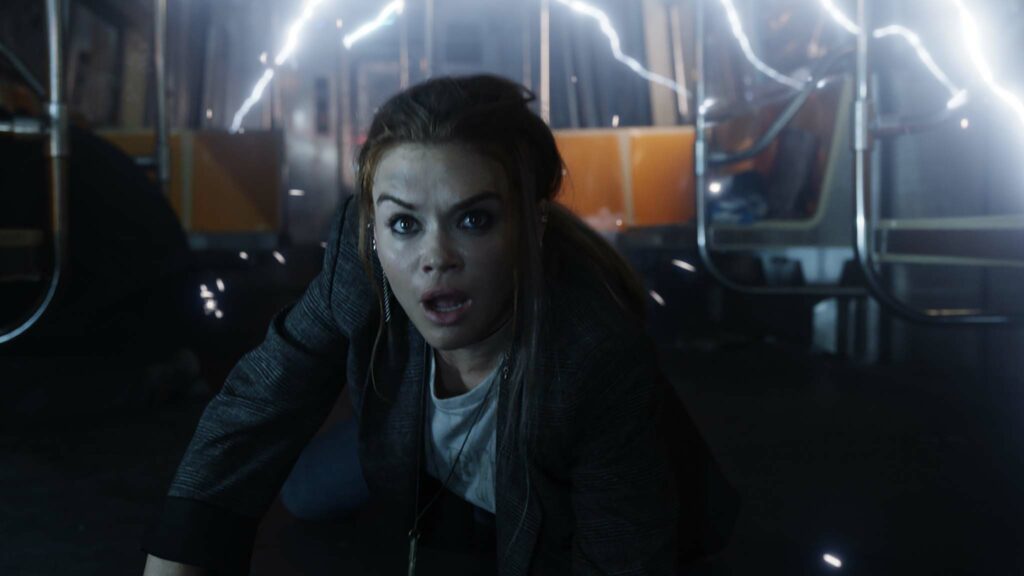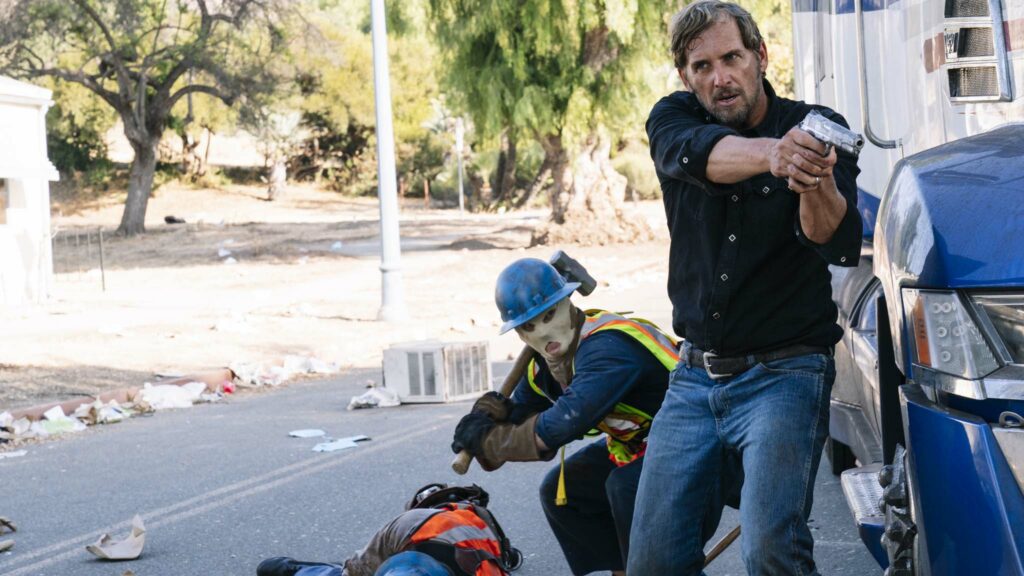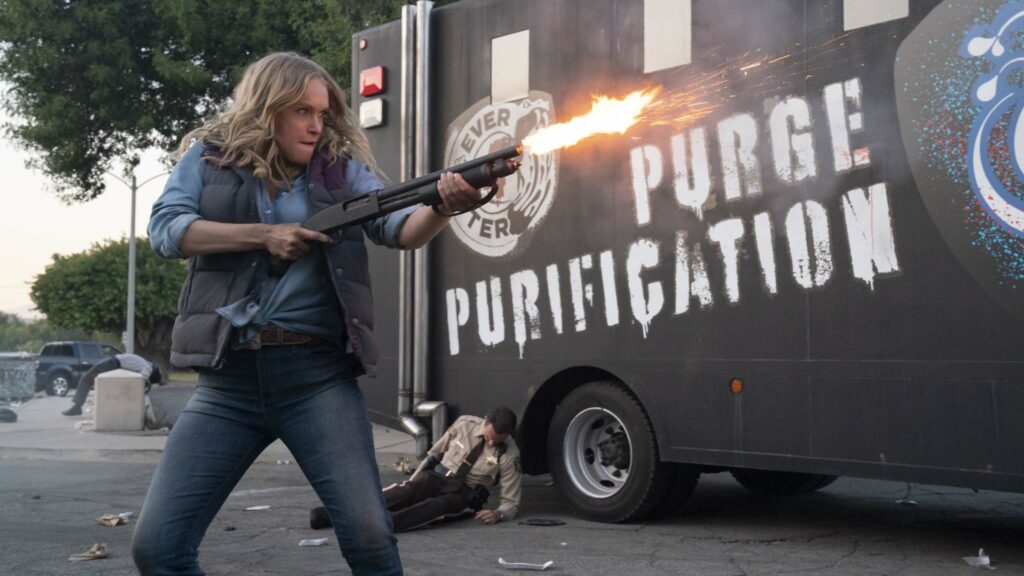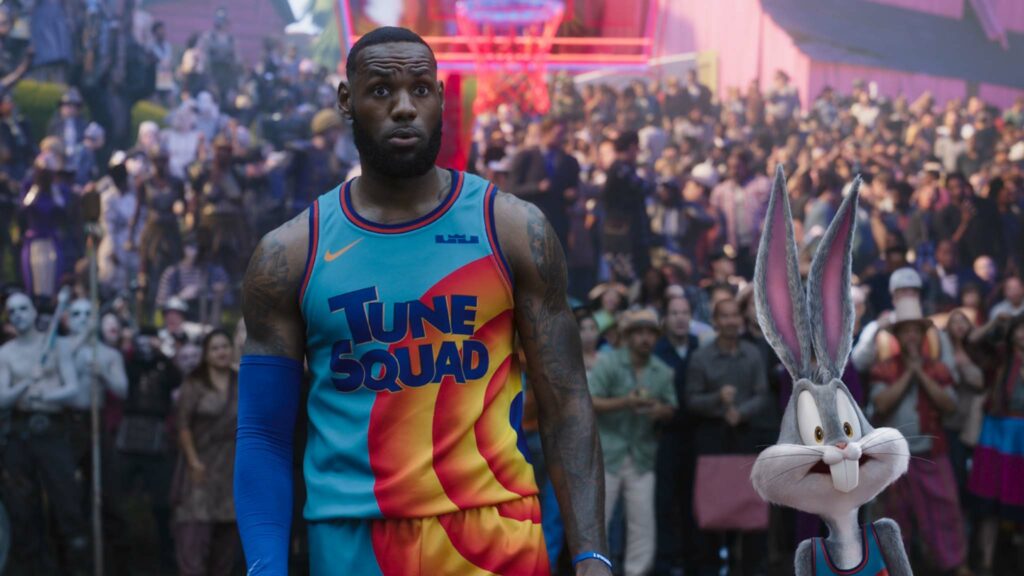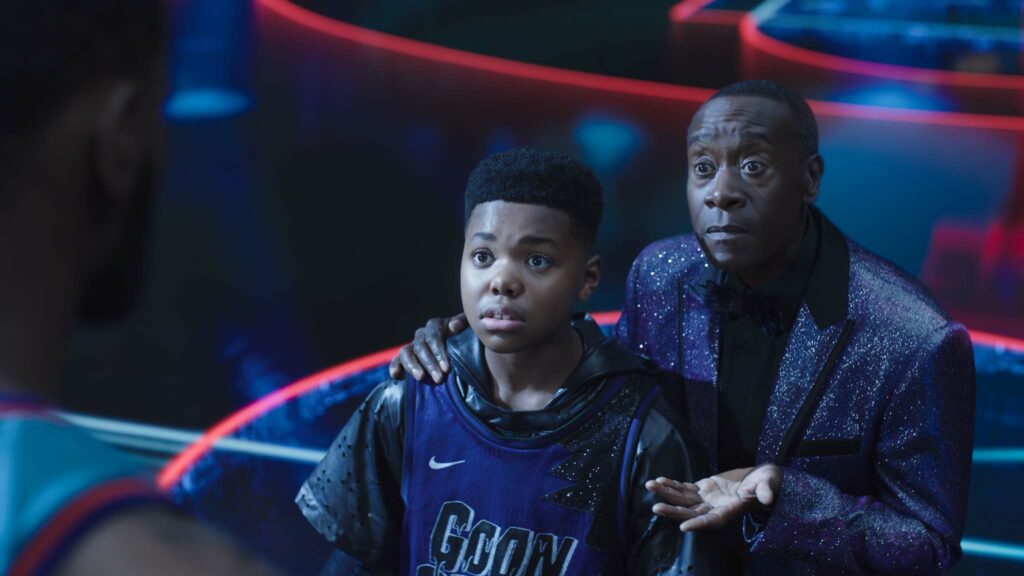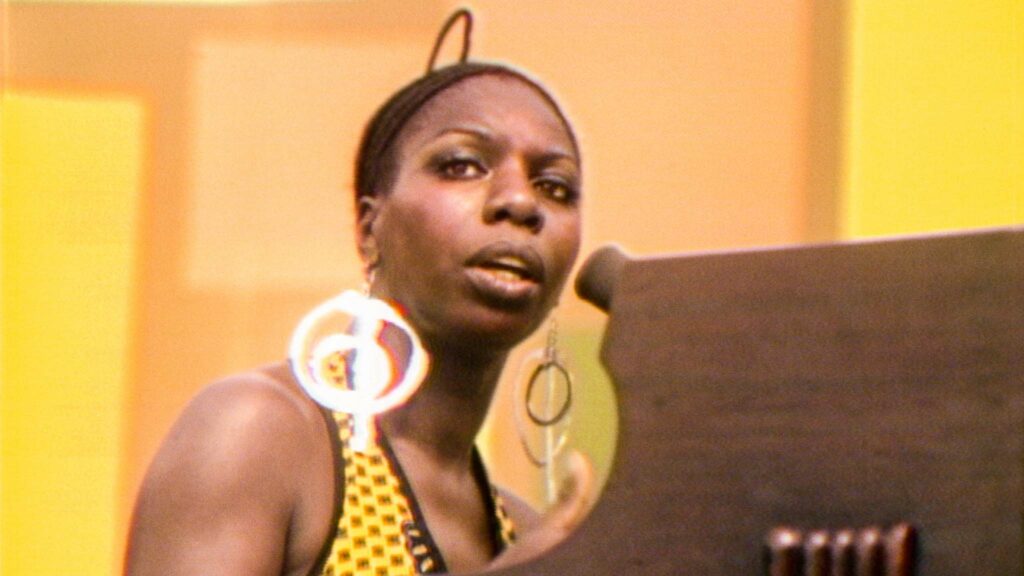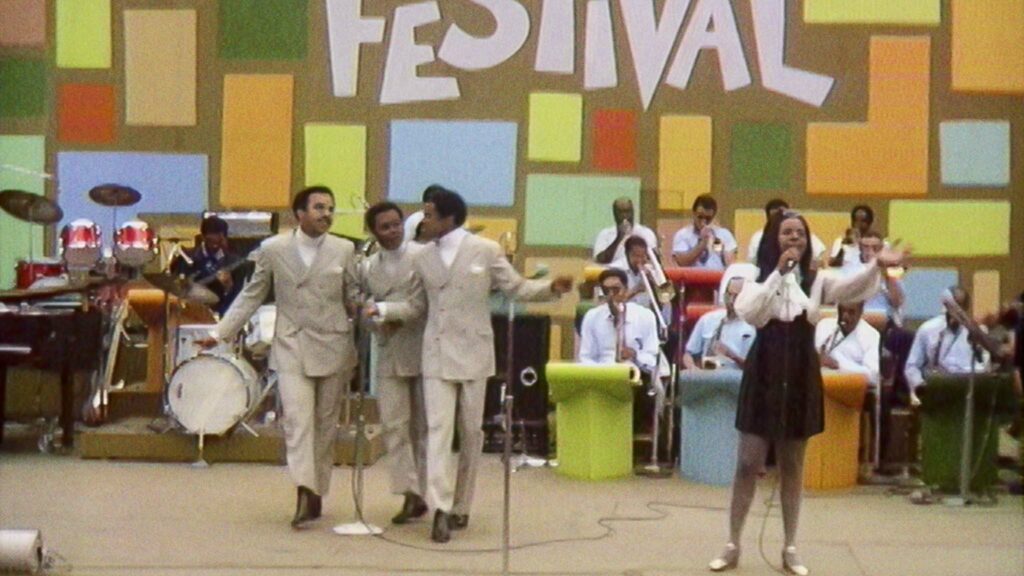Animation
The Croods 2: A New Age (U)
Review: Cut from the same mammoth-pelt loincloth as its 2013 predecessor, director Joel Crawford’s energetic computer-animated sequel forms a protective kill circle around its central theme of female empowerment and turns its back on emotionally layered storytelling and character development. Plotlines from the original thaw out in The Croods 2: A New Age, disguised by breathtaking visuals in retina-searing colour, including a thunderous opening set-piece of stampeding kangadillos underscored, amusingly, by The Partridge Family’s I Think I Love You. A crudely cleaved class divide between the eponymous cave family and refined rivals, who believe privacy promotes individuality, establishes a flimsy narrative framework to explore intergenerational conflict and the reluctance of parents to let offspring fly the nest.
A close encounter with a pack of howling wolf-spiders in the film’s frenetic final act loudly enforces the key message of family resolve in the face of adversity. Anachronistic gags about tablets and man-caves in a ramshackle script credited to Dan Hageman, Kevin Hageman, Paul Fisher and Bob Logan warrant appreciative smiles but belly laughs are few and far between, even with Ryan Reynolds working overtime among a starry voice cast. His character’s tragic back story gently plucks heartstrings in defiance of the Crood matriarch when she quips: “If no one’s died before breakfast it’s a win.”
Grug (voiced by Nicolas Cage) continues to lead his prehistoric brood comprising wife Ugga (Catherine Keener), son Thunk (Clark Duke), daughters Eep (Emma Stone) and Sandy (Kailey Crawford), and Gran (Cloris Leachman). The sanctity of the clan is threatened by Eep’s boyfriend Guy (Reynolds), who floats the idea of establishing a separate tribe with his beloved. “The pack is stronger together. Eve would never leave us,” Grug assures his unconvinced wife.
Before the young lovebirds formalise plans to blaze their own trail, Grug stumbles upon a food-rich haven cultivated by Phil (Peter Dinklage) and his wife Hope (Leslie Mann), who abide by one house rule: Don’t eat the bananas. “We’re the Bettermans… with an emphasis on the better,” chirrups Hope, who condescends to the Croods on their lower rung of the evolutionary food chain. Phil and Hope are closely connected to Guy’s past and they plot to prise him away from Eep so he can pair up with their daughter Dawn (Kelly Marie Tran).
The Croods 2: A New Age mocks its title by revisiting scenarios from the first film with additional visual lustre. Vocal performances are solid but franchise newcomers Dinklage and Mann are short-changed as antagonistic rivals. When the Bettermans fall short as a threat to the Croods’ happiness, Crawford’s picture introduces a pack of punch monkeys and a gargantuan Spiny Mandrilla to facilitate the inevitable reconciliations. The sequel goes bananas but we follow the Bettermans’ example and resist tucking in.
Find The Croods 2: A New Age in the cinemas
Horror
Escape Room: Tournament Of Champions (15)
Review: One wrong move proves fatal in director Adam Robitel’s sequel-by-numbers to his 2019 horror thriller, a gore-lite, teen-friendly variation on a theme of Saw which brought together six strangers to play for their lives in a series of diabolically designed rooms. His glossy follow-up is a direct continuation of the convoluted narrative, propelling two surviving characters on an ill-advised quest to bring to justice the murderous masterminds behind the Minos corporation. One tantalising scene from the original is noticeably omitted from an opening flashback montage – the filmmakers’ shorthand for “previously… on Escape Room” – and consequently draws attention to its importance in the grand design.
Puzzles in the sequel, credited to four writers, are satisfyingly complex, encouraging audiences to play along from their seats, but characters’ ingenuity under pressure is frustratingly inconsistent. One cryptic clue in a seaside-themed scenario could be solved far quicker and would change the outcome not just of that room but the entire film. At another critical juncture, scriptwriters are too cute for their own good and spoil arguably the biggest surprise with a needless introduction that tips the wink on Machiavellian ulterior motives. Taylor Russell and Logan Miller settle into a familiar groove of plucky likeability as the returning characters while a lack of background detail to most new additions to the cast spotlights the players most likely to make a fatal misstep.
Zoey Davis (Russell) and Ben Miller (Miller) barely survived their ordeal in the first Escape Room. A therapist (Lucy Newman-Williams) helps Zoe come to terms with her rage and guilt, anchored to the self-sacrifice of one motherly competitor (Deborah Ann Woll), while Ben suffers alone with repetitive nightmares of the walls closing in on him. The tormented duo are resolved to exposing the puppet masters by following coordinates embedded in the Minos logo, which point to an abandoned government building in the centre of Manhattan.
They board a subway train and find themselves sharing a carriage with four strangers – Brianna (Indya Moore), Nathan (Thomas Cocquerel), Rachel (Holland Roden) and Theo (Carlito Olivero) – who turn out to be victorious players from other Minos escape rooms. The six champions have been brought together to crack codes and conundrums in a strict time limit or pay the ultimate price: dodge successive chapters of the franchise, which are clearly teased by fleeting on-screen glimpses of the vast resources at Minos’ disposal.
Escape Room: Tournament Of Champions engineers more of the same largely bloodless thrills and spills, bringing the mythology full circle with minimum dramatic outlay. Set pieces look more expensive than the profitable first film but the same can’t be said of a script that fixates on a self-satisfied and knavish final destination rather than the satisfying journey to get there.
Find Escape Room: Tournament Of Champions in the cinemas
Horror
The Forever Purge (15)
Review: Shocking images of enraged Republican voters storming the Capitol in Washington DC, steadfast in their belief that democracy had been wilfully abused in the US presidential election, was a sobering reminder of the fault line running through America’s two-party political system and the pernicious power of social media to light a fuse on mob mentality. Screenwriter James DeMonaco, who gave birth to The Purge in 2013 – a government-sanctioned 12-hour period when American citizens can kill without legal reprisals – bluntly dials up the Trumpian narrative and immigration hysteria in the fifth instalment of the horror franchise. His script contrives a bloodthirsty battle royale close to the Mexican border and crudely echoes divisive rhetoric to pit geographical neighbours against each other under the auspices of making America great again.
Two sequels and one prequel after a neat inception, The Forever Purge directed by Everardo Valerio Gout runs on creative fumes and makes the fatal misstep of abandoning its own rules by unleashing a tsunami of poisonously patriotic violence across the 50 states. Nail-biting tension has always stemmed from characters fighting with every fibre in their bodies to survive until the deafening trill of the klaxon that signals the end of the annual Purge. Once DeMonaco’s script permits the slaughter to continue indefinitely, suspense evaporates and plausibility is fatally wounded as beleaguered characters move unscathed through running street battles between purgers, terrified citizens and the US Army National Guard.
In the fictional Texan border town of Los Feliz Valley, ranch owner Caleb Tucker (Will Patton) and his family, son Dylan (Josh Lucas), daughter Harper (Leven Rambin) and Dylan’s heavily pregnant wife Cassie (Cassidy Freeman), survive the annual Purge inside their fortified home. When the klaxon sounds, they release the metal shutters and come face to face with masked farm hands, who are coordinating attacks across the state to forcibly address wealth inequality with their guns and knives.
Mexican ranch hands Juan (Tenoch Huerta) and TT (Alejandro Edda), who are loyal to Caleb, intervene and go on the run with the terrified Tuckers in search of Juan’s wife Adela (Ana de la Reguera), who is a prime target for the Purge Purification Force led by Alpha (Jeffrey Doornbos).
The Forever Purge takes a sledgehammer to timely social and political concerns, reducing Texas to flaming rubble as Americans and Mexicans symbolically join forces to defeat a common enemy: intolerance. Huerta and de la Reguera’s characters are the most likable pawns in a serviceable plot that thinks big for tiny rewards. A Purger death trap involving a sacrificial goat feels misplaced, like something retrieved from the reject bin of the Saw movies, which ran out of steam years ago. Regrettably, DeMonaco’s dystopian creation suffers the same disappointing fate.
Find The Forever Purge in the cinemas
Comedy
Space Jam: A New Legacy (U)
Review: Occasionally, films gift-wrap their own stinging but fair criticism in the midst of the action. Space Jam: A New Legacy extends the hand of generosity in an early scene when Los Angeles Lakers basketball star LeBron James (playing himself) is invited to a film studio’s offices with his agent (Khris Davis) to discuss the possibility of having his body scanned to allow a photo-realistic digital doppelganger to headline blockbusters. “Athletes acting – it never goes well,” deadpans James. It certainly doesn’t in director Malcolm D Lee’s ungainly sequel. Twenty-five years after Michael Jordan slam dunked in Space Jam, James double dribbles with the Looney Tunes gang in two hours of relentless and unabashed self-promotion for Warner Bros.
It’s not sufficient for the script to pepper dialogue with gratuitous mentions of the film company financing this family-oriented fantasy. Logos are embedded in live-action and animated backdrops and intellectual properties from the studio’s vast back catalogue including Austin Powers, Casablanca, Game Of Thrones, Harry Potter, It, Mad Max, The Matrix and the DC Comics cinematic universe are mercilessly pillaged. There is no emotional pay-off or amusing punchline to the rapacious cross-promotion like The LEGO Movie. Instead, constant reminders of superior films and TV series from the vaults make us wish we weren’t stuck with the dull company of Lee’s picture, which preaches self-expression and individuality in the most heavy-handed fashion.
Proud husband and father LeBron James plays ball to provide for his wife Kamiyah (Sonequa Martin-Green) and three children, Darius (Ceyair J Wright), Xosha (Harper Leigh Alexander) and Dom (Cedric Joe). Thirteen-year-old Dom shuns his father’s highly regimented example on the basketball court to chase his dreams of becoming a video game designer. He has already built his first game, DomBall. The bond between father and son is strained when they are sucked into a computer server controlled by rogue artificial intelligence Al-G Rhythm (Don Cheadle).
The fame-hungry host poisons Dom against his father and forces LeBron to play alongside the Looney Tunes gang including Bugs Bunny, Lola Bunny (voiced by Zendaya), Elmer Fudd, Foghorn Leghorn, Gossamer, Granny, Porky Pig, Road Runner, Speedy Gonzalez (Gabriel Iglesias), Sylvester, Tasmanian Devil (Jim Cummings), Tweety Bird, Wile E Coyote and Yosemite Sam. Their supersized opponents, the Goon Squad, are animal-human hybrids of real-life professional basketball stars.
Space Jam: A New Legacy zips excitedly between live-action, digital 3D and hand-drawn animated universes but never finds a steady, pleasing rhythm. Solid performances are left on the bench while director Lee floods the screen with video game stylings to artificially boost animosity on the court. Cheadle’s arch-villain is ineffectual and a classic underdog storyline misses the endorphin rush of a crowd-pleasing grandstand finish. When the Looney Tunes wheel out their catchphrase – “That’s all folks!” – it’s a relief.
Find Space Jam: A New Legacy in the cinemas
Documentary
Summer Of Soul (12A)
Review: In August 1969, a dairy farm in Bethel, New York, attracted huge crowds to a rock festival billed as “3 Days of Peace & Music” featuring performances from Joan Baez, Creedence Clearwater Revival, Arlo Guthrie, Jimi Hendrix, Jefferson Airplane, Janis Joplin and The Who. The free-loving image of Woodstock was immortalised in a 1970 documentary directed by Michael Wadleigh and an accompanying film soundtrack.
The same summer, almost 100 miles south-east of Bethel, large crowds flocked to Mount Morris Park for the inaugural Harlem Cultural Festival masterminded by Tony Lawrence. Concerts headlined by The Fifth Dimension, Mahalia Jackson, Stevie Wonder, Mongo Santamaria and Nina Simone were also recorded for posterity but hours of precious film stock languished unseen in a basement for more than 50 years. The so-called Black Woodstock was largely forgotten, except by those who attended.
Lovingly restored footage from 1969 forms the spine of an exuberant documentary directed by musician Ahmir Khalib Thompson, aka Questlove, told in the words of festival performers and members of the public, who flocked to see their idols and party at “the ultimate black barbecue”. Summer Of Soul reminisces about a pivotal moment in time, which brought together the people of Harlem and captured a mood of change sweeping across America in the aftermath of the assassinations of Martin Luther King and Malcolm X. “The point of the festival may very well have been to stop folks tearing up the city,” suggests one contributor to the film, referring to riots and unrest in the largest African-American neighbourhood in Manhattan.
Performances by the likes of Abbey Lincoln & Max Roach, BB King, David Ruffin, The Edwin Hawkins Singers, Gladys Knight & The Pips, Hugh Masekela, Moms Mabley, Ray Barretto, Sly And The Family Stone and The Staple Singers are tightly interwoven with personal testimonies and reflections. “The point of music is to hold a mirror to ourselves and tell our stories,” says Hamilton creator Lin-Manuel Miranda flanked by his father, Luis Miranda, as they affirm the unity between black and Latin people.
Summer Of Soul is, to quote one nostalgic interviewee, “like a rose coming through the concrete”. The thorns of social and political upheaval are clearly visible: in news footage, festival-goers dismiss the Moon landing during one concert as a waste of money when communities in Harlem are crying out for financial support. Questlove strikes gold when he records musical artists watching themselves for the first time. Billy Davis Jr and Marilyn McCoo from The Fifth Dimension are rendered speechless and misty-eyed by their rendition of Aquarius/Let The Sun Shine In from the musical Hair. They break the silence with an amusing anecdote about the song’s inception courtesy of a misplaced wallet. The sunshine comes flooding in.
Find Summer Of Soul in the cinemas


